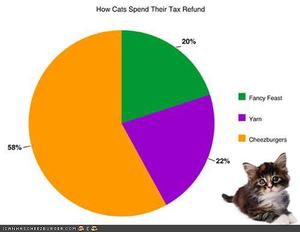
9 Tax Facts about Charitable Donations for Individuals and Small Business Owners
Every good act is charity. A man's true wealth hereafter is the good that he does in this world to his fellows. - Moliere. Unfortunately, the Canada Revenue Agency (CRA) has specific criteria for what qualifies as a charitable donation and not all good acts qualify for a tax benefit. Growing a moustache (although not without its costs) or running a marathon, are generally not considered to be a charitable donations according to the tax code. Luckily there are a multitude of charitable organizations that do qualify the donors to receive a tax credit for their donations. Some facts about the tax credit are discussed below:

Pros and Cons of Incorporating your small business
The decision to incorporate can be a difficult one that many small businesses face at some point in their lifetime and . Incorporation, literally, represents the creation of a new person. Whereas a sole proprietorship is an extension of one's self, a corporation takes on a life of it's own; it can give birth to subsidiary, marry via a merger and die with a dissolution. It has to file it's own tax return, can be sued and has a set of rules that govern it's existence. Below are some of the points to consider when deciding whether to incorporate:

Should You Pay Yourself a Salary or Dividend? 7 Considerations For Small Business Owners
While incorporation has many benefits for small business owners, it does introduce additional complexities that are not faced by registered businesses. Unincorporated business owners are essentially taxed on their net business income, which allows for more time to devote to tax planning and how to spend all of your richly deserved profits. Incorporated business owners, on the other hand, cannot just withdraw cash from their businesses as the need or whim arises. There needs to be a formalized structure in place which usually takes the form of either salary or dividends. Either type of remuneration has tax and other implications that need to be considered before making a decision.

What Is a Capital Dividend and How Does It Benefit Your Corporation
When an individual sells some property, investments or other assets (perhaps you have a Picasso lying around that's appreciated in value), only 50% of the gain is subject to tax. For example if you sell a rental property and realize a gain, after brokerage and expenses, of $100,000, only $50,000 will be taxable. (The actual tax that you pay will depend on your marginal tax rate at the time). The other 50% of the capital gain is a non taxable gain. For a corporation, however, this distinction is a little more complex. In order to allow corporations the same benefit as individuals with respect to capital gains and losses, the 50% non taxable portion of the gain on a corporate capital transaction is allocated to what is referred to as a Capital Dividend Account or CDA. The balance in the CDA, which is a cumulative balance over the lifetime of a corporation, is then available to the shareholders on a tax free basis.

4 Alternatives for Preparing Your Small Business Payroll
Paying salaries to employees (or yourself) requires more than just determining the gross amount to be paid. The Canada Revenue Agency and Revenue Quebec require that employers calculate a variety of taxes on the salaries paid, remit them to the federal and provincial governments and prepare annual reports demonstrating that the calculations are correct and all salary deductions have been paid. This can be a lot of work for business owners whose time is better spent generating sales and building their businesses. Luckily there are many options for small business owners to calculate their payroll and salary remittances, many of which simplify the process:

Why you should register for CRA and RQ My Business Account (and how to do it)
With all data moving to the cloud these days and ubiquitous online access to banking, customer and supplier portals, it makes sense that Revenue Canada (CRA) and Revenue Quebec (RQ) have followed suit. Considerable resources have been spent by the revenue agencies on developing their online portals and encouraging both individual taxpayers and businesses to move the majority of their tax related interactions online (almost every accountant conference has an appearance by a CRA representative talking about the improvements to their online portal and imploring accountants to convince their clients to make the switch). The upfront investment has resulted in significant cost savings for CRA/RQ (postage costs alone have dropped dramatically) while improving accuracy and perhaps most importantly increasing the effectiveness of tax collection efforts. CRA personnel have been able to move away from verifying calculations and manually reviewing tax returns to more value added analysis which has allowed them to identify tax miscreants with higher accuracy.
For both the individual taxpayer and small business owner there are numerous benefits to registering online:

Revenue Canada Interest, Penalties and Payment Arrangements for Income Tax and GST/HST Returns
Whether you are an individual or a business in Canada, taxes are an inescapable part of your existence. All sources of income need to be calculated, tax returns needs to be filed and taxes owing must be paid. This is somewhat facilitated if you are an employee as your employer tends to take care of the majority of remittances. Self-employed individuals, sole proprietorships, partnerships and corporations on the other hand, must account for their income and expenses , determine taxes payable and remit the appropriate amounts. Additionally, businesses are also responsible for other filings including GST/HST and QST and payroll. A lack of knowledge, imperfect accounting systems and the business of running a business sometimes interfere with the timeliness of filings. The Canada Revenue Agency attempts to curb these tardy behaviours by imposing penalties and interest on late filings as follows:
Unincorporat

Understanding Payroll Deductions: Personal Income Tax Rates, CPP/QPP, EI and Basic Exemption
The automation of the tax preparation and filing process has been a boon to individuals and tax preparers alike. Gone are the days of struggling to find the right box on the return, adding everything up 5 times and still getting different results, and hoping that the CRA can read your chicken scrawl. Present day tax software not only guides you through every step of the process, it also helps to optimize your allocations thereby reducing your taxes payable. There is however at least one downside to automation: Since we are more removed from the actual calculations, our understanding of our tax situation is somewhat diminished. We have an idea of what we expect to pay, which we can see every week on our paycheques (or for self employed individuals, the breathtaking moment when we see the final result on our tax return), but often we are not really sure how these amounts are derived. Below is a discussion of the tax rates, deductions and maximums to improve our comprehension of this somewhat complex topic:

Quebec Parental Benefits for Self Employed Workers
In Canada parental benefits are administered by Service Canada. Since they fall under the EI program, self employed workers must opt in tothe EI plan for self employed individuals to receive benefits. In Quebec however, unlike the rest of Canada (a common theme with Quebec), parental benefits are administered by the Quebec Parental Insurance Plan (QPIP), which does not specifically require opt in. Instead all workers in Quebec whether self employed or employees are required to pay premiums, based (similar to QPP) on their insurable earnings. For the self employed, premiums are payable at a rate of 0.86% upto maximum insurable earnings of $62,000, and are reflected in your annual tax return. As such all workers in Quebec are eligible for Parental Benefits.

What to Do When your Tax Obligations are Overdue

What Happened to Quebec Property Tax Refund?/ Preparing the RL31 and the solidarity tax credit
UPDATE: Beginning with the year ended December 31, 2015 landlords are required to provide tenants with an RL 31 slip which indicates the name of the tenant, the number of tenants at a particular address as well as the address of the tenant. Each individual listed on the lease must be issued an RL 31. Deadline for filing the form is February 28th following the year of residence and is only issued to tenants living at a particular dwelling December 31, 2019. The forms can be filed online through Revenue Quebec and is a fairly straightforward process. Failure to file the form by the landlord can result in a penalty. The form is then required to be used by the tenant to claim the portion of the solidarity tax credit relating to residence.
For Quebec taxpayers who have been trying to locate their RL-4 slips, the slip that your landlord usually provides, or the part on the tax forms or software where you would enter your property taxes (Schedule B), be advised that as of 2011, that this is no longer a specific tax credit. Prior to 2011, both property owners and renters could claim a portion of property taxes paid. This reduced income taxes payable for taxpayers whose total family income was under approximately $50k

What Small Business Owners Should Know about Leasing vs Buying their Car, Corporate Ownership of Vehicles and Deducting Car Expenses
5 Income Tax Tips from the Trenches
It is the time of year when many accountants and tax preparers live, breathe, eat and sleep taxes (leaving very little time to write about them!). And while much of it is routine, there are numerous issues that arise, the treatment for which is not immediately apparent and can actually be quite interesting (perhaps more so to a tax nerd), some of which are compiled below:
Invest in RRSPs or Repay your Mortgage?

